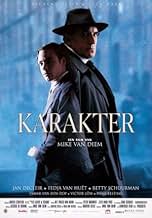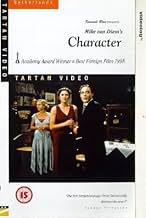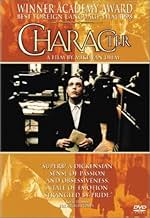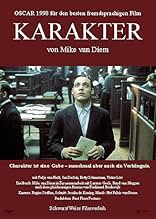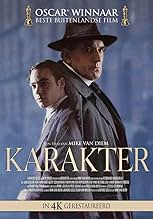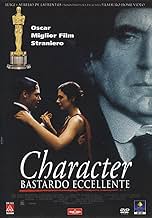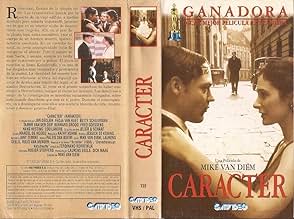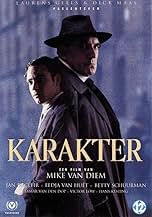IMDb रेटिंग
7.7/10
12 हज़ार
आपकी रेटिंग
अपनी भाषा में प्लॉट जोड़ेंJacob Katadreuffe lives mute with his mother, has no contact with his father who only works against him and wants to become a lawyer, at all costs.Jacob Katadreuffe lives mute with his mother, has no contact with his father who only works against him and wants to become a lawyer, at all costs.Jacob Katadreuffe lives mute with his mother, has no contact with his father who only works against him and wants to become a lawyer, at all costs.
- 1 ऑस्कर जीते
- 18 जीत और कुल 7 नामांकन
फ़ीचर्ड समीक्षाएं
10gevalher
This is one of the best movies that I've seen till now. I was reluctant at first to see this movie, because it was not a "Hollywood" product, but after so many times seeing the trailer at the theater it picked my curiosity.
The story was set in Netherlands, and it develops unfolding the relationship between a father and his son. This was one of the best movies I've seen in a long time, because it touches the bottom of our hearts making thinking us (the public) about our own -sometimes- conflictive relations with our parents.
The two main stars gave us a duel as I've never saw before in a film, and to top all of this, the supporting characters were all believable as well as the magnificent locations.
This films really told a story, reflects well its age and overall has a well developed timing so you'll never lose interest in what is next, and has so many twists that your interest never decays. But I really liked the final one. This one only scene pays all the money and time you spent seeing it.
OUTSTANDING!!
The story was set in Netherlands, and it develops unfolding the relationship between a father and his son. This was one of the best movies I've seen in a long time, because it touches the bottom of our hearts making thinking us (the public) about our own -sometimes- conflictive relations with our parents.
The two main stars gave us a duel as I've never saw before in a film, and to top all of this, the supporting characters were all believable as well as the magnificent locations.
This films really told a story, reflects well its age and overall has a well developed timing so you'll never lose interest in what is next, and has so many twists that your interest never decays. But I really liked the final one. This one only scene pays all the money and time you spent seeing it.
OUTSTANDING!!
10pedrito
In this film we are confronted with a perfect script if there ever was one! Once again, talented screenwriters have proved that a fine novel can be transformed into a great film, without losing any depth in philosophical understanding or psychological subtlety. In 'Character', the paired tension between pride and guilt, as well as between pride and love, or guilt and love, or love and power, gives birth to an astounding and magnificent lesson in human character and behavior. The fact that Mike van Diem and Laurens Geels, two of the film's three writers, were at the same time -respectively- its director and producer, plays no small role in the success of the script, since the novel by Bordewijk was read -and rewritten- from the perspective of cinema, and not the other way around. The psychological themes are treated as variations in a symphony, presented in one of the characters and later developed in another, or presented in one form and then transmuted into another, as the brilliant treatment given to the self-destructive tendencies in the Dreverhaven character, or the extreme laconism in the mother-son relationship. Seen at a tropical country as Ecuador (my own), surrounded by a teenage audience that was led to expect something else; an audience which was only very slowly won by the tense and restrained 'northern', 'iceberg' pace of the film, 'Character' transformed the screen into a gigantic and painful mirror filled with reflections of the sorrows and sufferings of human nature. And finally those teenagers stopped crunching chips and sipping sodas, and started thinking. A '10' by any standard.
How is it possible for a boy, whose parents are devoid of normal humanity, to grow up to be loved and respected? The film, Character, presents a credible demonstration. It has the darkness of Ingmar Bergman or Charles Dickens, is slow-moving, thoroughly engrossing and it left me emotionally drained, which always elicits a high rating from me.
Dreverhaven is apparently an evil man: a bailiff who is quite willing to evict people in a terrible storm. He embodies two Nietzschean concepts: 1.
the will to power (he entered into power struggles with anyone whom he felt he could dominate) and 2. that a life becomes better by becoming stronger through adversity (he did everything in his power to bring adversity to his son, believing that that would strengthen him--and in many ways it did). His internal struggle between the will to power over his son and his desire to strengthen him is the prime mover of the film; his son's reactions to that are the core. Dreverhaven is also totally fearless; the question arises whether it is caused by bravery or just being tired of life.
The film opens with his son, Jacob Katadreuffe (Fedja van Huêt), coming home, all bloody, only to be arrested as a suspect in the murder of Dreverhaven. He then tells the two interrogators a most amazing story. Since he is describing his own life, one might suspect that he is embellishing the story in his own favour but I believe that he was totally candid.
The story is too complex to dwell on but certain aspects must be mentioned. Jacob's mother, Joba (Betty Schuurman), was a servant to Dreverhaven. On one and only one occasion he may have raped her: it is not made clear if she resisted. As soon as she discovered that she was pregnant, she left him and tried to sever all ties. For a long time, however, Dreverhaven repeatedly proposed marriage and was refused. His motivation is ambiguous (propriety or affection) and Joba was apparently determined not to allow Dreverhaven to beat her in a power struggle.
Because of his Mother's silence, young Jacob believed that she did not like him and, being a pariah because he was illegitimate, he turned to books for solace. Through this he developed a love of learning and a willingness to work hard and he advanced rapidly in a law firm, winning the respect and admiration of most of his colleagues, especially De Gankelaar (Victor Löw), who hired him. De Gankelaar, a man with a huge underbite and a heart to match, became Jacob's mentor, adviser and protector.
Denied access to his son, Dreverhaven began a game of terror against Jacob through legal channels.
The film is a study of character and characters. Their motivations are subtly hidden by consistent and superb acting. In my attempts to understand this dysfunctional family (if it can be called a family) I was forced to think. The slow movement allowed time for that. I want to see the film again, expecting that each viewing will bring a closer understanding. Even the evil Dreverhaven was more an object of pity rather than despicable; his actions were caused more by ignorance of human sensitivities, a dogmatic respect for the law and an unusual philosophy rather than by malice. The film is open-ended. What will Jacob do with the rest of his life?
Dreverhaven is apparently an evil man: a bailiff who is quite willing to evict people in a terrible storm. He embodies two Nietzschean concepts: 1.
the will to power (he entered into power struggles with anyone whom he felt he could dominate) and 2. that a life becomes better by becoming stronger through adversity (he did everything in his power to bring adversity to his son, believing that that would strengthen him--and in many ways it did). His internal struggle between the will to power over his son and his desire to strengthen him is the prime mover of the film; his son's reactions to that are the core. Dreverhaven is also totally fearless; the question arises whether it is caused by bravery or just being tired of life.
The film opens with his son, Jacob Katadreuffe (Fedja van Huêt), coming home, all bloody, only to be arrested as a suspect in the murder of Dreverhaven. He then tells the two interrogators a most amazing story. Since he is describing his own life, one might suspect that he is embellishing the story in his own favour but I believe that he was totally candid.
The story is too complex to dwell on but certain aspects must be mentioned. Jacob's mother, Joba (Betty Schuurman), was a servant to Dreverhaven. On one and only one occasion he may have raped her: it is not made clear if she resisted. As soon as she discovered that she was pregnant, she left him and tried to sever all ties. For a long time, however, Dreverhaven repeatedly proposed marriage and was refused. His motivation is ambiguous (propriety or affection) and Joba was apparently determined not to allow Dreverhaven to beat her in a power struggle.
Because of his Mother's silence, young Jacob believed that she did not like him and, being a pariah because he was illegitimate, he turned to books for solace. Through this he developed a love of learning and a willingness to work hard and he advanced rapidly in a law firm, winning the respect and admiration of most of his colleagues, especially De Gankelaar (Victor Löw), who hired him. De Gankelaar, a man with a huge underbite and a heart to match, became Jacob's mentor, adviser and protector.
Denied access to his son, Dreverhaven began a game of terror against Jacob through legal channels.
The film is a study of character and characters. Their motivations are subtly hidden by consistent and superb acting. In my attempts to understand this dysfunctional family (if it can be called a family) I was forced to think. The slow movement allowed time for that. I want to see the film again, expecting that each viewing will bring a closer understanding. Even the evil Dreverhaven was more an object of pity rather than despicable; his actions were caused more by ignorance of human sensitivities, a dogmatic respect for the law and an unusual philosophy rather than by malice. The film is open-ended. What will Jacob do with the rest of his life?
Character is one of the best period films I have ever seen, and the enormous quantity of very interesting aspects in it make it worth watching.
I saw this film with the natural curiosity that a best foreign film Academy Award arouses in many people, and I was really delighted and surprised (Altough, I must admit I had hoped Spain's Secrets of the Heart would win). The story is quite beautiful, and Mike van Diem created a very solid screen play based on well known Ferdinand Bordewijk's novel.
The film has some extraordinary moments; I must say that the one that impressed me most was the final scene of the film, a scene of great visual impact and also of an incredibly big narrative content; it is the scene that reveals the mystery behind the cruel A.B. Dreverhaven's behaviour.
The performances given out in this film are simply spectacular especially Jan Decleir's as Dreverhaven. I also think Betty Schuurman as Jacob's mother and Victor Löw as De Gankelaar are terrific. One more thing, the art design is beautiful; the image the film gives us of the 1930's Amsterdam is very powerful and very beautiful.
Not only is it a great film then, but it is a story that carries a lot of feelings, and will take you on quiet an emotional ride. I can only say this: enjoy it!
I saw this film with the natural curiosity that a best foreign film Academy Award arouses in many people, and I was really delighted and surprised (Altough, I must admit I had hoped Spain's Secrets of the Heart would win). The story is quite beautiful, and Mike van Diem created a very solid screen play based on well known Ferdinand Bordewijk's novel.
The film has some extraordinary moments; I must say that the one that impressed me most was the final scene of the film, a scene of great visual impact and also of an incredibly big narrative content; it is the scene that reveals the mystery behind the cruel A.B. Dreverhaven's behaviour.
The performances given out in this film are simply spectacular especially Jan Decleir's as Dreverhaven. I also think Betty Schuurman as Jacob's mother and Victor Löw as De Gankelaar are terrific. One more thing, the art design is beautiful; the image the film gives us of the 1930's Amsterdam is very powerful and very beautiful.
Not only is it a great film then, but it is a story that carries a lot of feelings, and will take you on quiet an emotional ride. I can only say this: enjoy it!
In the 20's, in Netherlands, Jacob Willem Katadreuffe (Fedja van Huêt) has just concluded the law school and has an argument with the High Court Enforcement Officer Dreverhaven (Jan Decleir) at his office. Katadreuffe leaves the place covered in blood. On the next morning, he is arrested by the police for the murder of Dreverhaven. He claims that he is innocent and discloses the story of his life to the Chief of Police.
His mother Joba (Betty Schuurman) was the maid at Dreverhaven. One night, she is raped by him and a couple of weeks later she learns that she is pregnant. Dreverhaven proposes to marry her but Joba quits her job and leaves his house. Along the years, Katadreuffe is bullied at school and called bastard by his mates and his mother never talks to him. One day, he is involved by other kids in a theft of bread and arrested by the police. When he calls his biological father to help him, Dreverhaven tells the police that he does not know who Katadreuffe is. The boy is intelligent and learns English reading a superseded and incomplete edition of encyclopedia that was left behind by the previous tenants of his apartment. Katadreuffe is also ambitious and asks for a job in a law office, where he becomes the protégé of his mentor De Gankelaar (Victor Löw). Soon he falls in unrequited love with the secretary Lorna Te George Victor (Tamar van den Dop). Along the years, Dreverhaven uses his power to harm him. When he concluded his course, he decides to pay a visit to Dreverhaven to tell him that he has wined their dispute. May Katadreuffe have killed Dreverhaven?
"Karakter" is a dark film about a young man needy of fatherly love. The intercourse between his parents is never clear whether it was a rape, as per the trailer, or consensual sex. In the view of Katadreuffe, his mother has always been "mute". But maybe it could be a trauma for her only intercourse since she is a stubborn woman. Dreverhaven is a mysterious and ambiguous character. Is he only cruel or is he trying to harden his son to face the challenges of the brutal society where they live and be a winner? The screenplay is very well-written and keeps the attention of the viewer until the last scene. The cinematography, set decoration and art direction are perfect and bring the viewer to Netherlands in the middle 20's. The cast has magnificent performance highlighting Jan Decleir. My vote is eight.
Title (Brazil): "Caráter" ("Character")
His mother Joba (Betty Schuurman) was the maid at Dreverhaven. One night, she is raped by him and a couple of weeks later she learns that she is pregnant. Dreverhaven proposes to marry her but Joba quits her job and leaves his house. Along the years, Katadreuffe is bullied at school and called bastard by his mates and his mother never talks to him. One day, he is involved by other kids in a theft of bread and arrested by the police. When he calls his biological father to help him, Dreverhaven tells the police that he does not know who Katadreuffe is. The boy is intelligent and learns English reading a superseded and incomplete edition of encyclopedia that was left behind by the previous tenants of his apartment. Katadreuffe is also ambitious and asks for a job in a law office, where he becomes the protégé of his mentor De Gankelaar (Victor Löw). Soon he falls in unrequited love with the secretary Lorna Te George Victor (Tamar van den Dop). Along the years, Dreverhaven uses his power to harm him. When he concluded his course, he decides to pay a visit to Dreverhaven to tell him that he has wined their dispute. May Katadreuffe have killed Dreverhaven?
"Karakter" is a dark film about a young man needy of fatherly love. The intercourse between his parents is never clear whether it was a rape, as per the trailer, or consensual sex. In the view of Katadreuffe, his mother has always been "mute". But maybe it could be a trauma for her only intercourse since she is a stubborn woman. Dreverhaven is a mysterious and ambiguous character. Is he only cruel or is he trying to harden his son to face the challenges of the brutal society where they live and be a winner? The screenplay is very well-written and keeps the attention of the viewer until the last scene. The cinematography, set decoration and art direction are perfect and bring the viewer to Netherlands in the middle 20's. The cast has magnificent performance highlighting Jan Decleir. My vote is eight.
Title (Brazil): "Caráter" ("Character")
क्या आपको पता है
- ट्रिवियाAlthough the story takes place in the Dutch city of Rotterdam, many scenes were filmed in other cities across The Netherlands and Europe. This was because Rotterdam has very few buildings from this era left following heavy bombing during the Second World War. Filming locations included: Hamburg (Germany), Wroclaw (Poland), Antwerp and Ghent (Belgium) and The Hague (The Netherlands).
- गूफ़In one of the street scenes, you can see an extra in modern outfit and with no headwear on.
- भाव
Joba: Why don't you leave our boy in peace?
Dreverhaven: I'll strangle him for nine-tenths, and the last tenth will make him strong.
टॉप पसंद
रेटिंग देने के लिए साइन-इन करें और वैयक्तिकृत सुझावों के लिए वॉचलिस्ट करें
- How long is Character?Alexa द्वारा संचालित
विवरण
- रिलीज़ की तारीख़
- कंट्री ऑफ़ ओरिजिन
- आधिकारिक साइट
- भाषाएं
- इस रूप में भी जाना जाता है
- Character
- फ़िल्माने की जगहें
- व्रोकला, डॉल्नोस्लास्की, पोलैंड(Miernicza 27, Wroclaw, Dolnoslaskie, Poland)
- उत्पादन कंपनियां
- IMDbPro पर और कंपनी क्रेडिट देखें
बॉक्स ऑफ़िस
- बजट
- $45,00,000(अनुमानित)
- US और कनाडा में सकल
- $6,23,983
- US और कनाडा में पहले सप्ताह में कुल कमाई
- $37,268
- 29 मार्च 1998
- दुनिया भर में सकल
- $6,23,983
- चलने की अवधि
- 2 घं 2 मि(122 min)
- रंग
- ध्वनि मिश्रण
- पक्ष अनुपात
- 1.85 : 1
इस पेज में योगदान दें
किसी बदलाव का सुझाव दें या अनुपलब्ध कॉन्टेंट जोड़ें


